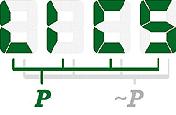Paper: The type and effect discipline (at LICS 1992)
Authors: Talpin, J.-P. Jouvelot, P.Abstract
The type and effect discipline, a framework for reconstructing the principal type and the minimal effect of expressions in implicitly typed polymorphic functional languages that support imperative constructs, is introduced. The type and effect discipline outperforms other polymorphic type systems. Just as types abstract collections of concrete values, effects denote imperative operations on regions. Regions abstract sets of possibly aliased memory locations. Effects are used to control type generalization in the presence of imperative constructs while regions delimit observable side effects. The observable effects of an expression range over the regions that are free in its type environment and its type; effects related to local data structures can be discarded during type reconstruction. The type of an expression can be generalized with respect to the variables that are not free in the type environment or in the observable effect
BibTeX
@InProceedings{TalpinJouvelot-Thetypeandeffectdis,
author = {Talpin, J.-P. and Jouvelot, P.},
title = {The type and effect discipline},
booktitle = {Proceedings of the Seventh Annual IEEE Symp. on Logic in Computer Science, {LICS} 1992},
year = 1992,
editor = {Andre Scedrov},
month = {June},
pages = {162--173},
location = {Santa Cruz, CA, USA},
publisher = {IEEE Computer Society Press}
}
